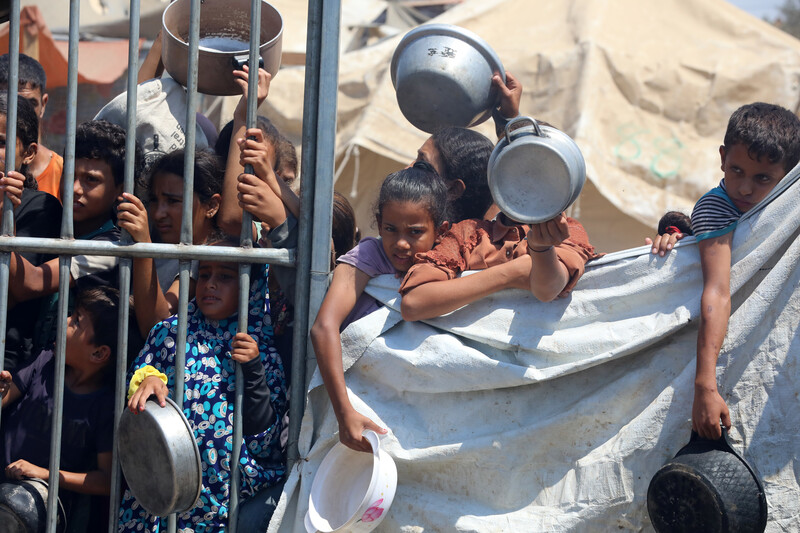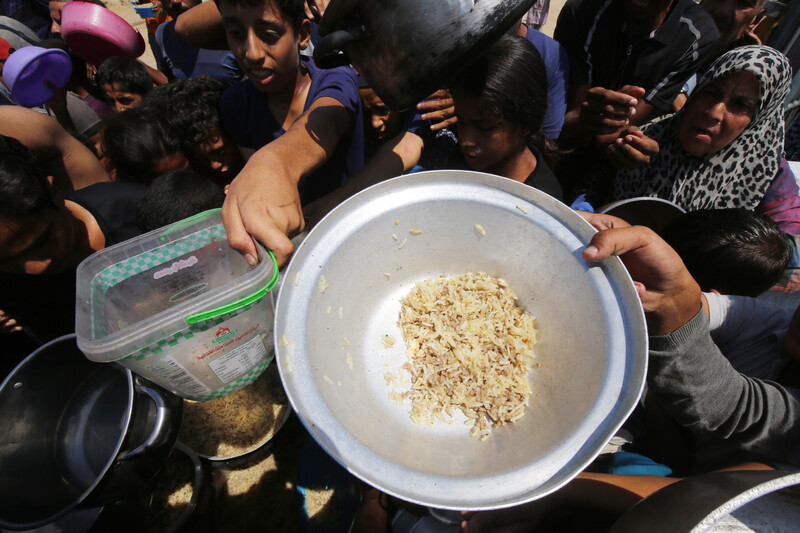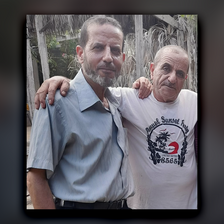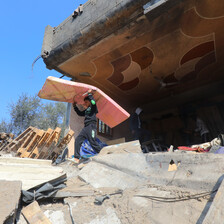The Electronic Intifada 23 September 2024

Children in Deir al-Balah await food from a charity kitchen. The UN has called Gaza’s Israeli-imposed famine ”one of the most severe” in the organization’s history.
APA imagesHala Adel’s life – like everyone else’s in Gaza – has been upended by the ongoing genocide and famine as she is still trapped in Gaza’s north.
“Time seems to have lost its meaning during this war,” the 30-year-old said. “Emptiness is not something I can tolerate; I thrive on development and achievement.”
Before the Israeli military invasion, Hala, who has a degree in business administration, had a job she liked, and she enjoyed socializing with friends on the weekends.
“We would gather, chat, and recharge for the week ahead,” she recalled.
These moments now exist only in her memories. Israel’s genocide has left just days of relentless struggle for survival.
Hala said she frequently looks through old photos, trying to keep these cherished memories alive in her mind.
“Initially, I felt I was living in a nightmare, praying to wake up. But as the war dragged on into its eleventh month, I started to fear that this nightmare has become our new reality,” she told The Electronic Intifada.
Hala and her family were early on in the genocide forced to flee intense aerial bombardments. They first found refuge in a house crammed with about 40 people.
The conditions were “unimaginable. The search for food, water, privacy, even basic hygiene became daily struggles,” she said.
And in the south, the family had no links.
“We had no one there and feared we would end up in the street,” Hala said.
She and her family chose to stay north, believing the war would soon end.
Temporary return
When a brief truce was declared, Hala’s family returned home, only to face renewed violence.
“We found ourselves trapped in our home, taking shelter in a room filled with sand on the ground floor. We were 14 people, huddled together with nothing to protect us but our prayers,” she recounted.
The relentless shelling made every moment a battle for survival.
“Shrapnel rained down on us, and the house shook as if hit by an earthquake. We saw death before our eyes, saying goodbye to each other, convinced we would not survive,” Hala said.
She thought often of her sisters abroad and her little nephew, realizing they might never reunite.
A brief pause in the shelling allowed Hala and her family to evacuate.
“We ran, clinging to each other, and returned to the same overcrowded house where we had sought refuge during the first truce,” Hala recalled.
It was December. They had no thick blankets or warm clothes to protect against the cold.
“My cousin and I slept on the bare ground, covered with a single thin blanket. The cold was unbearable. We waited for dawn, when it would be our turn to take the blanket and mattresses from those who had slept earlier,” she said.
As the war dragged on, food and water became increasingly scarce. White flour disappeared from the markets, and fresh water grew increasingly hard to find.
Early in the genocide, Israel announced that it would cut food, water, fuel and electricity to the strip. By September this year, the UN called Gaza’s nutrition situation “one of the most severe we have ever seen.”
“We depended on eating what was only available like dokkah [a blend of nuts, seeds and spices] and thyme, with each person rationed to half a wafer for breakfast and one wafer for lunch,” Hala said.
With no flour they bought barley and ground it to stave off hunger. The poor quality of food and polluted water took a toll on Hala’s family’s health, leading to stomach and intestinal pains worsened by the relentless cold.
The Israel aerial bombardments, the fire belts, and the shells that threatened to bring down their house intensified. Eventually, the military entered and besieged the area where Hala and her family had sought refuge.
“We were confined to one room, without food or water, awaiting our fate,” Hala recalled.
They prayed constantly, facing a week-long siege before the Israeli soldiers finally left.
Returning home, they found their house further damaged but still standing.
Isolation
For three months, Hala and her family lived in isolation, unable to send or receive any messages.
“No one knew if we were alive, and we didn’t know if our loved ones had survived. I feared that I might die without anyone knowing what had happened to me, that I might die hungry, cold, and afraid,” she said.
She found comfort in looking at pictures of her loved ones. The thought of being forgotten and dying unknown was a constant fear.
As famine hit home, especially during Ramadan, Hala’s family survived on barley grains, rotten wheat, and whatever food they could scavenge.
Hala’s father, who has a heart condition, required medicine and additional food.
“We divided our rations to ensure he had enough to sustain him through his treatments,” Hala said.
Money became meaningless. There was nothing to buy. They sold their damaged car to pay for medicine and food, but the sale did not bring in much money.
When the Israeli army announced that the way to the south was open for those wanting to escape starvation, Hala’s father refused to leave.
“Here is humiliation, and there is humiliation. I’d rather be humiliated in my home than in the streets,” he told Hala.
Her family moved to the beach for a while, exhausted by the endless cycle of displacement, fear, and scarcity.
When the Israeli army eventually withdrew, Hala’s family returned to their damaged home, relieved it was still standing.
“We struggled to find water and rebuild what little we could,” she said. “We have been through so many psychological stages — tension, fatigue, despair — but we tell ourselves that we are on the side of truth and that God will stand with us.
“One day, God willing, we will see Gaza whole again, and we will live to see good days return. Gaza will rise from the ashes.”
Walking with eyes closed
Before the genocide, Maryam Ibrahim enjoyed a fulfilling life as a wife, mother and student, juggling parenting, volunteering and training in various fields, particularly marketing and managing civil society organizations.
“Life was somewhat stable,” she remembered.
She and her baby son, Alaa, would spend their days exploring the streets, visiting the beach, and enjoying trips to the Qattan Center for the Child.
They celebrated Alaa’s first birthday on 27 September 2023.
On 7 October, Maryam and her family were startled awake by the sounds of missiles, unsure of what was happening. During the chaos, they received evacuation orders via leaflets.
Maryam said they first moved to her sister-in-law’s house.
“We thought we’d stay just a couple of days and return, but the situation worsened,” she said.
When a neighboring house was bombed, they fled again. This was all within the first week of the war.
Initially, the situation seemed manageable. There was enough food, including vegetables, fruits and chicken.
“We stocked up for a month,” Maryam recounted. “But as time passed, the situation deteriorated.”
Shop shelves became bare, prices soared, and famine set in.
“We ran out of flour and started eating animal food, barley bread that is made for fodder, and cornbread,” she said.
She and her family were limited to two meals a day, often just one, mostly rice and bread.
The UN estimates that 90 percent of Gaza’s children have “at best” eaten just two types of food for weeks and months, and more than 50,000 need immediate treatment for acute malnutrition.
Maryam tried to save bread for her son, who only knew rice as a staple. “He would sometimes refuse to eat if there was nothing new,” she said.
With no access to clean water, Maryam and the others had to drink salty untreated water.
“During one of our displacements, we only managed to bring food and a bottle of water for Alaa,” she recalled.
Despite fleeing under shelling and gunfire, her mother insisted on carrying provisions for the baby. When some aid finally arrived, Alaa ate apples for the first time, consuming seven in a day.
“He also tried chicken and eggs, which was a big deal for him,” Maryam said.
Dreams of cheese
After that, such foods became scarce again.
Maryam would buy eggs whenever possible, as Alaa’s joy over them was obvious.
“He calls them ‘benda’ and celebrates when he gets one,” Maryam said.
Canned food became a lifeline amid the dire conditions, though it was hardly ideal.
“We were grateful for chickpeas, beans, and peas, but Alaa refused them. He preferred dried thyme with olive oil and pasta,” Maryam explained. She recalled one moment of joy when Alaa tasted canned tuna, exclaiming, “Mama, this is chicken.”
“It breaks my heart that he’s deprived of even the simplest things,” Maryam said.

A ration of food from a charity kitchen in Deir al-Balah on 27 August. The UN estimates that more than 50,000 children in Gaza need immediate treatment for acute malnutrition.
APA imagesA relative from the south sent some cheese, which Alaa adored, even mentioning it in his sleep. Despite numerous pleas for help from organizations, Maryam said she received no assistance.
Alaa is terrified of the bombings, often seeking comfort from his mother during air raids. “He calls the sounds of planes and destroyed buildings ‘booms’ and gets very anxious around drones,” she said.
And with little food available and the priority going to her son, Maryam too is suffering. She has little physical energy to play with her son or pursue thoughts of a bigger family.
“I want to give Alaa a sibling, but with no food or water, I don’t know how I would manage,” she told The Electronic Intifada. She weaned Alaa because she was struggling to provide him with adequate nutrition.
“I miss walking in the early mornings, having breakfast by the sea, and enjoying the company of friends and family,” Maryam said, reminiscing about clean streets, the sea breeze, and vibrant life.
She finds it difficult to cope with the loss and the fear of further invasions. The lack of market, food, and familiar faces is overwhelming, she said, and she feels increasingly hopeless as the genocide continues, doubtful that life will ever return to what it was.
“I wish I could walk through al-Rimal. It used to be full of life and vitality. I miss the old Gaza that I know.” she lamented.
Choosing to stay
When Karmel al-Jubairi’s house was destroyed, her husband, her, and their three children, Majd, 9; Amir, 7; and Rose, who is just three months old, were forced to seek refuge at her brother-in-law’s small house.
“We refused to leave northern Gaza,” Karmel said. “We believe in God’s presence and judgment everywhere. Displacement seemed like an unavoidable fate, but we chose to stay.”
She said her pregnancy with Rose was a harrowing experience, spent entirely under extreme, wartime conditions.
“I gave birth amidst the chaos of war, under the most difficult circumstances,” she told The Electronic Intifada.
In the initial stages of Israel’s assault, Karmel moved from her apartment due to the escalating destruction around her and relocated to her father-in-law’s house, hoping for safety in the al-Rimal area.
But the situation deteriorated further.
“The intense fear from the constant missile attacks was overwhelming,” she said. “The first two weeks were especially tense with widespread displacement, and we had to decide whether to follow others or stay.”
Water, electricity and food became scarce.
“We went a whole month without taking showers due to the lack of water. It was nearly impossible to find healthy food. Flour was scarce, and we resorted to feeding our children animal feed,” Karmel said. . Her weight plummeted from 158 to about 127 pounds in the first months of her pregnancy. Her family, like many others, grew weak and malnourished.
“We were living on a meal of rice that we had stockpiled before the war,” she said. “We relied on old bread, spoiled food, and minimal water.”
Communication with the outside world was cut off, leaving Karmel anxious about her family’s fate. The situation grew more dire when she learned about the invasion in al-Saftawi area in the north of Gaza, where her mother had taken refuge.
The “hardest news”
Learning that her mother and brother’s wife had been killed “was the hardest news to receive,” Karmel said.
When the Israeli military invaded al-Rimal, the family hunkered down in silence. She had to crawl to the bathroom, she told The Electronic Intifada, to get a small amount of water for the children, “just to keep them quiet.”
Eventually, the occupation forces withdrew, but the damage was extensive.
Karmel’s home was destroyed.
“I lost my house and my mother. I was waiting for my mother to come and ease my pain after losing my house. But I had to remain strong for my children and the baby in my belly,” she said.
Ramadan arrived amid severe famine.
“We had very little food and mostly ate mallow. Each day was a struggle to find water and cook with limited resources.” Karmel said. “As a pregnant woman, I was supposed to eat healthy food, which was impossible at that time. Instead, I relied on canned foods.”
As the situation worsened in the north, where health centers were out of service and most had been targeted by the Israeli military, Karmel’s labor pains were fraught with fear of finding a safe place to give birth.
“All health centers were destroyed, and I was terrified of delivering in such conditions,” she said.
Despite the odds, on 1 June, Karmel gave birth to Rose at the Al-Sahaba Medical Complex.
“I had to rely on expensive milk formulas first. Due to the fact that I didn’t eat healthy food, I struggled with breastfeeding and my milk was of not much use.”
Eventually, Karmel did manage to breastfeed but she is still suffering malnutrition.
“I wish for basic nutrition, fruits and vegetables, but currently we only have access to halawa, starchy foods, and rice,” she said.
Bu she insisted, there is no hardship she won’t bear to stay home.
“I will never, ever leave Gaza no matter what. I have faith that we will see better days.”
The author is a writer and translator from Gaza.





